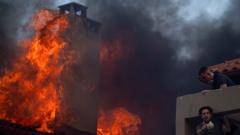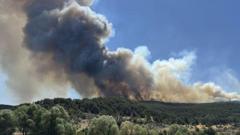As North America endures its first significant summer heatwave, health warnings are in place, with over 160 million people affected. High humidity and extended heat risk health complications, prompting advisories from the National Weather Service.
Major Heatwave Sweeps Across North America, Affecting Millions

Major Heatwave Sweeps Across North America, Affecting Millions
Severe heat alerts issued across the eastern United States and parts of Canada amidst record-breaking temperatures.
As summer officially kicks off, a substantial heatwave has descended on the eastern half of North America, prompting health warnings and major disruptions to daily life. The US Midwest through to the East Coast, alongside regions in Ontario, Quebec, and Nova Scotia, are under significant heat alerts, impacting over 160 million people for the week ahead.
Experts caution that the rising temperatures, intensified by high humidity, can lead to heat-related illnesses, especially with scant relief during nighttime where temperatures may remain above 80°F (27°C).
This heatwave coincides with unusually high readings less than a week into the summer season. Forecasters predict that some areas could see record-breaking temperatures, with the Mid-Atlantic region experiencing the highest heat intensities by Thursday, extending into the eastern Ohio Valley by Friday. The prolonged nature of this heatwave could significantly heighten health hazards in these locales.
The National Weather Service (NWS) urges vigilance regarding symptoms of heat exhaustion and stroke, recommending people limit sun exposure during peak heat hours, remain hydrated, and check in on those at greater risk, such as the elderly and those with existing health conditions.
This summer's heatwave has the potential to exceed historical June records across many regions. In New York, for instance, temperatures could spike to 101°F (38°C) on Tuesday, which would tie with the city’s all-time high for June set in 1966.
In light of soaring energy demands due to widespread air conditioning usage, energy companies along the East Coast have called on residents to conserve power to avoid the risk of blackouts.






















